
This award was created in 2003 to honour the contributions made by a person(s) or non-profit organization whose efforts have made significant contributions to the well-being and advancement of the Urban Indigenous Community of Toronto. Mino Bimaadiziwin, “living the Good Life”, is a part of being for Indigenous persons. The successful recipient will have lived up to Mino Bimaadiziwin and promoted this inside and outside of the community. This could be specific to areas such as health, housing, governance, human rights, culture, values, and or self-determination.
The award is open to residents of Toronto or non-profit organizations that provide a program or service for Indigenous residents. Preference will be given to person(s) with lived experience as an Indigenous person.
Examples of contributions include services or advocacy work on issues such as:
Joyce Carpenter is a member of Alderville First Nation a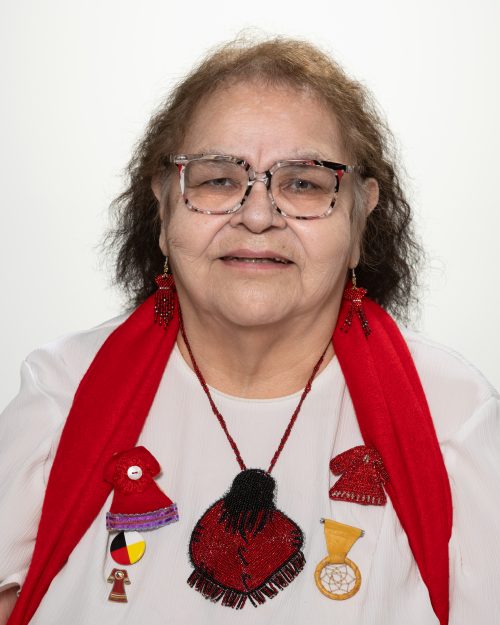 nd has been a pillar of care, advocacy and love within the Toronto urban Indigenous community for over 45 years. She spent many years working in Indigenous and Northern Affairs, facilitating the placement of educators in northern communities, as well as organizations such as Native Women’s Resource Centre of Toronto and Toronto Council Fire. Now retired, Joyce continues to be heavily involved in the Indigenous community in Toronto, including becoming a tireless advocate for Missing and Murdered Indigenous Women, Girls and Two-Spirit People (MMIWGT2S+), in honour of her daughter, Patricia, whose life was taken in Toronto in 1992 just two weeks shy of her 15th birthday. She continues to tell Patricia’s story to keep her memory alive and support with the healing of other families. Joyce has mobilized education throughout the city about the importance of justice for MMIWGT2S+, co-founding the Shades of Our Sisters exhibit and constantly participating in MMIWGT2S+ grassroots initiatives.
nd has been a pillar of care, advocacy and love within the Toronto urban Indigenous community for over 45 years. She spent many years working in Indigenous and Northern Affairs, facilitating the placement of educators in northern communities, as well as organizations such as Native Women’s Resource Centre of Toronto and Toronto Council Fire. Now retired, Joyce continues to be heavily involved in the Indigenous community in Toronto, including becoming a tireless advocate for Missing and Murdered Indigenous Women, Girls and Two-Spirit People (MMIWGT2S+), in honour of her daughter, Patricia, whose life was taken in Toronto in 1992 just two weeks shy of her 15th birthday. She continues to tell Patricia’s story to keep her memory alive and support with the healing of other families. Joyce has mobilized education throughout the city about the importance of justice for MMIWGT2S+, co-founding the Shades of Our Sisters exhibit and constantly participating in MMIWGT2S+ grassroots initiatives.
In addition, Joyce consistently works to support unhoused Indigenous community members, checking in on Elders, and opened her door to youth to live with her so they could attend high school. She also started food banks at Toronto Council Fire and Native Women’s Resource Centre.
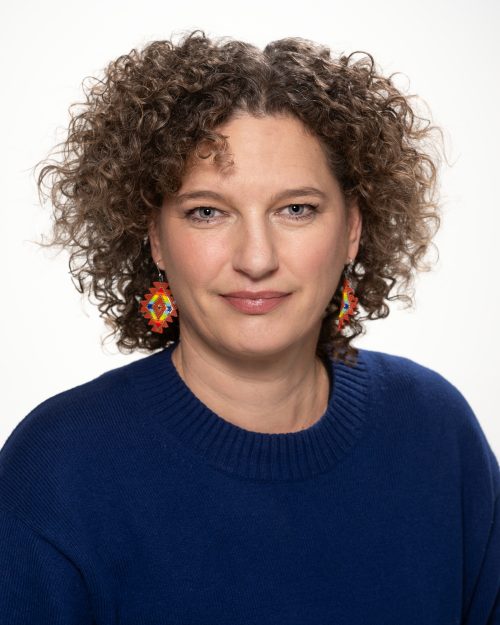
Shannon Simpson is Anishinaabe and Scottish and is a member of the Michi Saagiig of Alderville First Nation. She has worked at the University of Toronto (U of T) since 2003 in a variety of positions, including over a decade at the Indigenous Student Services at First Nations House. In 2020 she joined the Office of Indigenous Initiatives and is currently the Senior Director, Indigenous Initiatives. In her role as Senior Director, Indigenous Initiatives, Shannon works closely with the Provostial Academic Advisors of Indigenous Research and Curriculum and faculty members in areas such as mentorship, curriculum development, and protocols for community-based research involving Indigenous peoples. She deepens the learning of the non-Indigenous U of T community by supporting the expansion of Indigenous cultural competency training to all students and employees. She also oversees the development of the annual progress report to assess the institution’s progress in meeting its commitments to reconciliation, identified by a U of T steering committee of Elders, Indigenous students, faculty members, and staff in the wake of the Truth and Reconciliation Commission of Canada’s Final Report. She has played pivotal roles in the realization of the renovation of First Nations House (a “home away from home” for Indigenous U of T students) and the Ziibiing landscape project, a learning, teaching, and ceremonial place close to completion at the centre of St. George campus.
Prior to joining U of T, Shannon spent six years at Anduhyaun Inc., an Indigenous organization in Toronto that offers shelter and second stage housing to Indigenous women and children recovering from the traumas of violence and houselessness. She served on the board of Na Me Res (Native Men’s Residence) for a decade and currently for the past 16 years has sat as a volunteer community council member for Aboriginal Legal Services. She is co-chair of the Community Council at the Toronto Birth Centre, where she has volunteered for nine years.
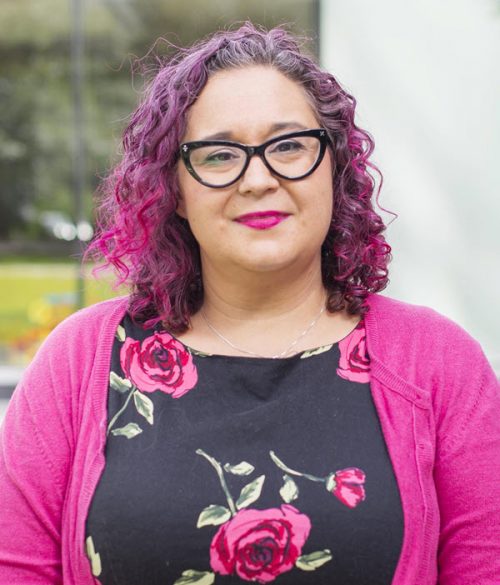 Dr. Ruth Green is an activist, academic and volunteer with a demonstrated track record in leadership through her work as an anti-violence advocate, researcher, community-based educator and published scholar. Dr. Green identifies as an urban Indigenous person and is a citizen of the Haudenosaunee Confederacy. She is from the Mohawk Nation and a member of the Turtle Clan. In addition to her role as a professor at York University’s School of Social Work, she has served as co-chair of the university’s Indigenous Council and as Special Advisor to the President on Indigenous Initiatives, as well as volunteers to mentor Indigenous students.
Dr. Ruth Green is an activist, academic and volunteer with a demonstrated track record in leadership through her work as an anti-violence advocate, researcher, community-based educator and published scholar. Dr. Green identifies as an urban Indigenous person and is a citizen of the Haudenosaunee Confederacy. She is from the Mohawk Nation and a member of the Turtle Clan. In addition to her role as a professor at York University’s School of Social Work, she has served as co-chair of the university’s Indigenous Council and as Special Advisor to the President on Indigenous Initiatives, as well as volunteers to mentor Indigenous students.
During her tenure as board chair at the Indigenous Friends Association, the tech start-up developed an innovative app that provides culturally respectful support to postsecondary Indigenous students across the country. The organization also developed award-winning coding boot camps for Indigenous and non-Indigenous youth to create dialogue around truth, reconciliation, and Indigenous resurgence while learning essential STEM skills.
Dr. Green has also volunteered with Aboriginal Legal Services for more than 16 years, serves on the board of Native Child and Family Services and is a member of the City of Toronto’s Aboriginal Affairs Advisory Committee. A sought-after speaker, trainer, and group facilitator on a range of disability, human rights, and transformative justice issues, she has built relationships with diverse groups such as Black Lives Matter Toronto, YWCA Canada, No One is Illegal, Social Planning Toronto, and Newcomer Women’s Services Canada.
Ernest W Matton, (Athehsa Niohkwá:rita:a)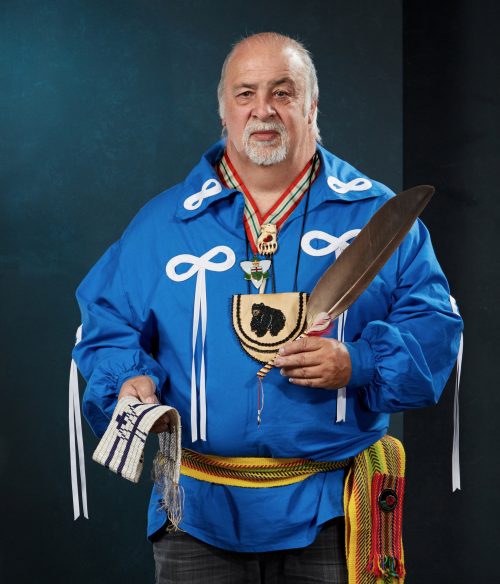 is a respected Métis Elder, and spiritual ambassador who blends traditional teachings with mainstream information to provide holistic healing approaches for Aboriginal and non-Aboriginal community members and professional disciplines. He is a sought-after seminar speaker, an effective group facilitator and an expert in the areas of trauma, addictions, mental health, grief, suicide, conflict resolution, forgiveness, mediation, anger release, and building healthy relationships.
is a respected Métis Elder, and spiritual ambassador who blends traditional teachings with mainstream information to provide holistic healing approaches for Aboriginal and non-Aboriginal community members and professional disciplines. He is a sought-after seminar speaker, an effective group facilitator and an expert in the areas of trauma, addictions, mental health, grief, suicide, conflict resolution, forgiveness, mediation, anger release, and building healthy relationships.
He shares this expertise as a proud member of the Toronto East Health Network family, where he is the Manager of Indigenous Culture and the Conductor of the Bear’s Den All Nations Medicine Sweat Lodge – a program he has spent the past eight years developing. Elder Little Brown Bear’s guiding philosophy is simple – “People don’t care how much you know. They want to know how much you care.”
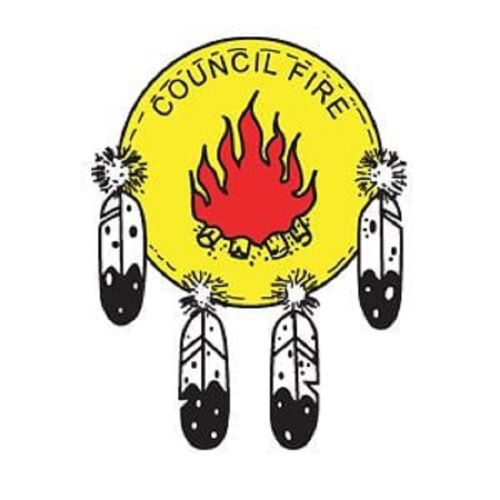 The work initiated in 1976 by the founding Board members of Toronto Council Fire Native Cultural Centre has allowed each successive Board and staff to continue to assist our people in becoming aware of their cultural background as well as their potential in education, employment and to strive for spiritual and personal growth through acceptance of each other.
The work initiated in 1976 by the founding Board members of Toronto Council Fire Native Cultural Centre has allowed each successive Board and staff to continue to assist our people in becoming aware of their cultural background as well as their potential in education, employment and to strive for spiritual and personal growth through acceptance of each other.
The Centre utilizes cultural teachings and languages in all their work and strives to improve the quality of life of Aboriginal families by nurturing the development and creation of healthy opportunities. This work includes the development of youth; promotion and employment of Aboriginal people in the area of arts, culture, education and information and technology; supporting housing and shelter services; enhancing economic growth, and continuing to build on the natural healing relationship with Mother Earth.
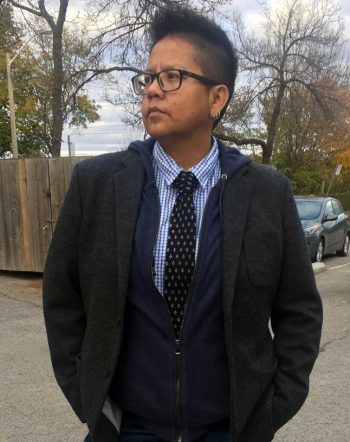
Percy Lezard is a Syilx two-spirit, gender non-conforming person from the Penticton Indian Band (Okanagan).
Percy, a survivor of the inter-generational impacts of residential schools, brings Indigenous pedagogies and ways of being into academic spaces to dismantle the terror and trauma both their parents and older sibling were subjected to in the Indian residential schools.
Percy is a community-based educator and researcher with 29 years of social service practice. Percy has been the HIV/AIDS educator at 2-Spirited People of the 1st Nations in Toronto for the past 13 years. During that time, Percy has provided numerous training sessions, specifically to non-Indigenous social service agencies on best practices when working with Indigenous, Two-Spirit, Trans and Non-Binary community members.
Percy has also been the sole Aboriginal staff person at several non-profit provincial and national agencies. At the Assaulted Women’s Helpline, Percy started as a crisis line counselor and then took on the position of being the agency’s trainer to bring together Indigenous knowledge and healing approaches to those who experience gender-based violence in their relationships.
Currently, Percy is a Professor of Social Work at Ryerson University. Their mantra for many years has been to create a culture of healing from an Indigenous/Aboriginal worldview for educational and social service systems. Percy constantly brings to their work in the community ways to build relationships with non-Indigenous communities, while still challenging us to work on our privilege while honouring the fact that we are guests on First Nations lands.
Fizul Sima has worked in areas that empower Indigenous Peoples in Canada and the United States. He joined the Canadian federal government in 2003 and was appointed as the National Council of Aboriginal Federal Employees’ (NCAFE) Chair of the Toolkits for Success Committee in 2006. His work focused on issues relating to Indigenous employment and Indigenous cultural awareness.
From his time with NCAFE, Fizul was appointed Co-Chair of the Deputy Minister’s Aboriginal Workforce Initiative in 2014. His recommendations and advocacy led to the launch of various federal public service initiatives including the Indigenous Inventory for University Graduates, an Indigenous leadership program and toolkits in Indigenous career recruitment, retention and advancement. This work has been shared nationally and locally in Toronto with the Dodem Kanonsha’, Native Canadian Centre of Toronto and the Native Child and Family Services of Toronto.
In 2016, Fizul created videos on how to catalogue books and provided software for a lending library system to create Indigenous community libraries. His mentoring and leadership in book drives created the Scarborough Child and Family Centre Library at the Native Child and Family Services of Toronto.
Prior to joining the Canadian government, Fizul worked for the Organization of American States (OAS) in Washington D.C. and developed the first toolkit to promote distance education to Native Americans. His work was recognized by three State Governors and he was made an honorary citizen of North Dakota in 1998.
Fizul is Mi’kmaq, originally from Annapolis Valley, Nova Scotia.
Joanne has made extraordinary contributions in the area of counselling, advising and education as well as empowering and capacity building with the the Aboriginal community in Toronto. Joanne has worked with a variety of organizations including Ministry of Health Canada, the Royal Ontario Conservatory fo Music, Centre for Addiction and Mental Health, Ryerson University, York University, Seneca College, Diabetes Association of Ontario, Native Canadian Centre of Toronto, Native Women’s Resource Centre of Toronto as well as several First Nations and social service agencies. Her work has transformed lives and improved relations between the Aboriginal community elder, counselor and traditional healer and a deserving candidate for this award.
Joanne Dallaire, Shadow Hawk Woman of the Wolf Clan, is Cree Omushkego with ancestry from Attawapiskat, Ontario. For the past 10 years, she has worked at Ryerson as an Elder and Traditional Counsellor. In her role, she provides traditional openings and closings, presentations, information on Aboriginal issues and training and counselling for Aboriginal events or ceremonies and more.
Joanne has spent over 30 years in the areas of counselling, advising and educating Aboriginal and non Aboriginal individuals and organizations on various Aboriginal topics. In 2011, she was celebrated at Ryerson with an Honourary Doctor of Laws Degree by the Faculty of Community Services for her tireless and many achievements. She is also a proud mother and grandmother.
As a leader, Joanne’s philosophy is to shine a light on the path for others, empowering them to make their own choices, and assisting them with recognizing their own leadership qualities.
David Abbott has made an outstanding contribution to the Aboriginal community in Toronto through his unwavering commitment to the Aboriginal Economic Business Development Project (AEBDP). David has played a pivotal role by bringing together stakeholders and facilitating dialogue in the public and private sectors for an initiative that will lay the foundation for a sustainable Aboriginal business community in downtown Toronto. The project, sponsored by the Metcalf Foundation, promotes new strategies to address access to business opportunities, quality jobs and economic livelihood for Aboriginal people in the GTA.
The AEBDP seeks to create an environment where a diverse cross-section of Aboriginal groups and individuals can engage with academia, government, business and industry supporters to support a visioning process, allowing for multiple ‘points of integration’. The project is the initiation of a long-term creative solution to build wealth in the downtown eastside and to increase the self-sufficiency and equitable employment opportunities for the growing Aboriginal population.
This project will directly support the recommendations of the 2011 Toronto Aboriginal Research Project (TARP). These recommendations target both Aboriginal youth and adults and focus on meaningful skills development, mentorship, internships and ‘experience with real life work situations’. The recommendations also call for program development between the private sector, trade unions, and educational institutions to ‘create employment incentives, upgrading, apprentice, special education and training programs focusing specifically on the education and training needs of Aboriginal homeless people in Toronto’.
David has served on various boards including the Native Canadian Centre of Toronto and the Native Women’s Resource Centre of Toronto. Currently, he serves on the Advisory Board for the Aboriginal Professional Association of Canada.
Steven Vanloffeld is Ojibway from Saugeen First Nation, Ontario. In both his professional and personal life, Steven has demonstrated a strong commitment to civic participation from the time he was elected the first Student Class president of Aboriginal decent at St. Mary’s high school in Owen Sound. He has since garnered a great deal of professional and volunteer experience advocating for the advancement and well-being of Aboriginal people.
Since moving to Toronto, Steven has worked tirelessly to build partnerships between Toronto’s Aboriginal community and key decision-makers at the grassroots, municipal, provincial and national level, within an educational and a non-profit community organization setting.
As past President of the Aboriginal People’s Commission (APC-ON) for the Liberal Party of Canada and the current Toronto representative, Steven represents and promotes the interests of Aboriginal members and encourages the active and equitable participation of Aboriginal people at all levels of the party structure, with particular emphasis on civic engagement of Aboriginal people within the GTA.
Steven’s commitment to the advancement of Toronto’s Aboriginal community is further illustrated by his role as the volunteer founder and organizer of the 4 Directions Aboriginal Networking group, which brought together Aboriginal post-secondary students, Aboriginal community members and non-Aboriginal business people to identify solutions to common challenges. Steven also played an active role as a volunteer member of the Board of Directors for two Aboriginal service organizations, demonstrating a strong commitment to the well-being of Aboriginal men, children and families in Toronto.
Steven’s advocacy efforts further extend through his Master’s thesis work on consultation of Aboriginal people within an urban environment.